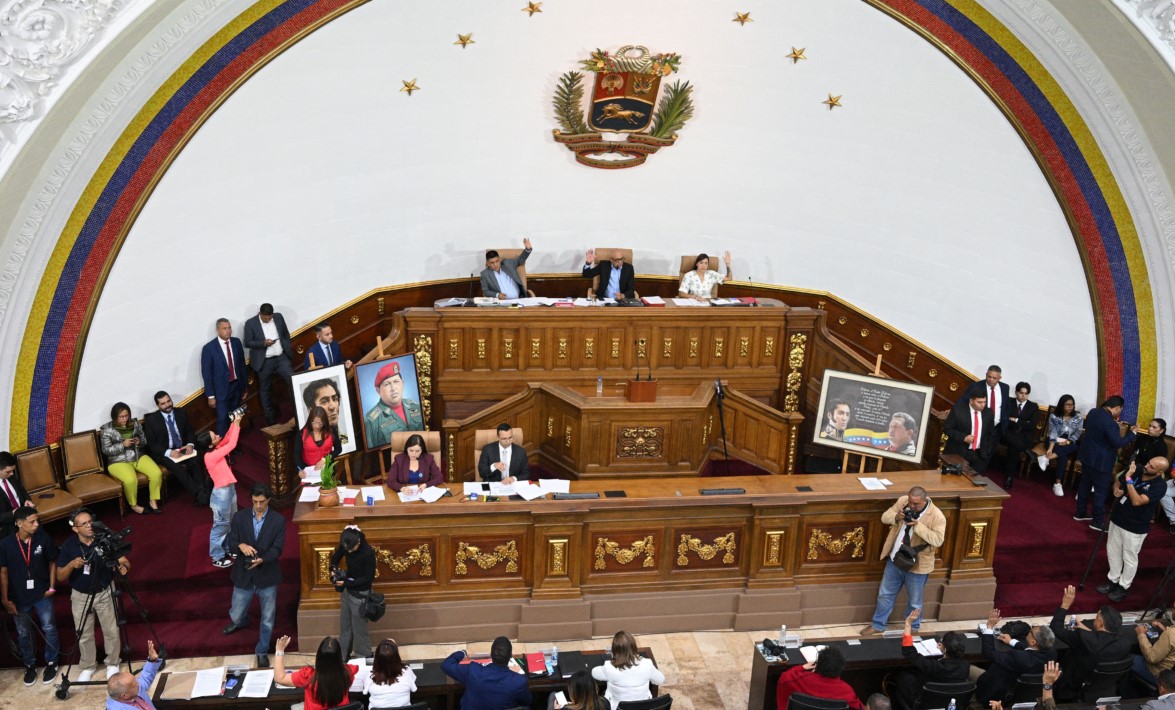The Anti-NGO Law approved in Venezuela: Its History and Scope

On August 15, the Venezuelan National Assembly approved the bill on the control, regularization, performance and financing of NGOs and related entities. The text will be sent to the Executive for its promulgation in the Official Gazette. The reform of the framework that regulates these entities had been in the Government’s sights for years. This article will be devoted to providing a brief history of the process of enactment of the law, as well as explaining its main scopes,
Brief history
The bill was presented by Diosdado Cabello, Deputy and Vice President of the United Socialist Party of Venezuela (PSUV), in 2023, but the “debate” was suddenly reactivated in January 2024 after the president of the Assembly listed it among the priorities of this year’s legislative agenda.
In mid-January 2024 there was a call for a “public consultation” which was not very consultative or public, since the content of what was to be submitted for discussion was not made known to society. Two weeks later, it was approved in committee in a closed-book meeting flanked by a security operation.
In mid-May, it was taken up again. Julio García Zerpa (PSUV), first Vice President of the Permanent Committee of Internal Policy, argued the need for this legal framework to ensure transparency and accountability.
In the midst of a deep radicalization of pressures on the civic space during the following months, on August 12, Deputy Jorge Rodriguez (brother of current Vice President and Minister of Economy Delcy Rodriguez) made a series of worrying announcements.
At the request of Nicolas Maduro, the decision was made to suspend the parliamentary recess, in order to approve a package of laws with the idea of “protecting the population” from “expressions of hate in social networks”, terrorism and the “dissemination of fascist ideas”. He pointed out that in the country there are many social organizations that function as “facades” and commandos against the interests of the homeland.
In previous editions of CSG, it was repeatedly warned about the dangers that a government with even more powers to repress the opposition and limit freedom of expression would bring. A scenario that has only worsened since the elections?

What does the law say?
This law is not a regulatory regime, it is a regime of intimidation that puts at risk consolidated organizations and the many that work informally providing basic assistance to populations in the interior of the country.
In addition to the nine articles approved during the month of May, thirty articles have been approved during the last two sessions.
The following is a selection of the most important articles dealt with on August 13 and 15.
- Article 10 – Applicable forms. It states that the organizations may be constituted under any lawful form or denomination. However, in order to obtain legal personality, they must be constituted as associations, corporations, civil societies or foundations of a private nature, as provided for in the Civil Code.
- Article 11 – Competent Body. It contemplates that the Autonomous Service of Registries and Notaries shall be the competent body to grant legal personality to the organizations, as well as for the registration of the acts related to their operation, in application of the provisions of the Civil Code and regulations in matters of public registries and this law.
- Article 12 – Application for registration. Stipulates that only natural or juridical persons with civil capacity to contract and bind themselves may register an organization. In order to obtain legal personality, the representatives must submit to the competent body in matters of public registries the statutory articles of incorporation of the organization, accompanied by a copy of the identification of the owner and the tax information record of each of the persons who are part of the organization, after verification of the availability of the name provided for the organization.
- Article 13 – Content of the articles of incorporation. It establishes that the articles of incorporation of the organizations must indicate the name, nature and domicile, the object and purposes, the duration of the organization, territorial scope, identification of the founding and associate members, regime of membership and exclusion of the members and their rights and obligations, internal structure and obligations, patrimony, inventory of assets, disciplinary regime, details of assignment of assets in case of foundations, and if its financing is or will be made partially or totally by foreign natural or juridical persons.
- Article 15 – Prohibition of registration. It states that the registration of the organization will not proceed if its object or purpose is to promote fascism, intolerance and hatred for racial, religious, political, social, ideological, gender or any other nature that constitutes incitement to discrimination; as well as those that are contrary to the provisions of the Constitution of Venezuela.
- Article 18 – National registry of non-governmental organizations and non-profit social organizations. Stipulates that the Ministry of the People’s Power with competence in matters of Justice shall constitute and maintain a national registry of the organizations, which shall have information corresponding to the constitution, operation, financing and modification of the same. The agency shall issue the necessary administrative acts to regulate the national registry.
- Article 22 – Duties. It establishes that the organizations shall comply with the Constitution, the law and the regulations in force in the country, keep books and accounting records in accordance with civil and tax regulations, and notify the competent agency about the financing with donations that will be received, in order to demonstrate the legality of the funds and the compliance with this law.
- Article 23 – Prohibitions. It states that non-governmental organizations, throughout the national territory, may not receive contributions destined to organizations with political purposes or make contributions to such organizations. Neither may they carry out activities typical of political parties or organizations with political purposes, nor receive funds for the financing of terrorism or the commission of terrorist acts.
- Article 24 – Domicile. It states that the domicile of the organizations, whatever their purpose may be, is the place where their management or administration is located, except as provided in their bylaws or in special laws.
- Article 25 – Patrimonial regime. It contemplates the patrimonial regime, allowing organizations to acquire, own and sell assets, as well as to administer and perform legal acts or enter into acts and agreements, provided that such acts are compatible with their nature and are exclusively intended for the fulfillment of their corporate purpose.
- Article 26 – Relevant Acts. Proposes that once legal personality has been obtained, such entities must declare for registration purposes before the competent body in matters of public registries, the list of donations received with full identification of the donors, indicating whether they are national or foreign, accidental or permanent, the modification of the bylaws, the termination of members, general powers, delegation of powers, opening or closing of headquarters, and change of reason and corporate purpose.
- Article 28 – Dissolution. Establishes the grounds for dissolution of the organizations, including those established in the bylaws of the organization, the expiration of the term established in its bylaws, incurring in the prohibitions of the law, and failure to pay fines imposed by this law.
- Article 30 – Preventive measure. The deputies approved that, in case there are “sufficient grounds” to consider that any of the prohibitions set forth in the law have been incurred, the Ministry of the People’s Power with competence in Justice may preventively agree, by means of a motivated act, the suspension of the operation of the organization. This measure must be notified to the competent jurisdictional body within the following 15 days in order for it to pronounce on its proceeding and continuity. If the notification is not made within the established term, the preventive measure shall lapse.
- Article 31 – Obligation to register. It establishes that organizations domiciled outside the national territory that intend to develop activities in the country must previously register in the registry of non-domiciled organizations, managed by the Ministry of the People’s Power with competence in Foreign Affairs.
- Article 33 – Specific obligations. It states that organizations domiciled outside the national territory that wish to operate in Venezuela shall enjoy the same rights and shall be subject to the duties and prohibitions set forth in this law, as well as to the supervision and control mechanisms of the National Executive.
- Article 34 – Duties of natural persons of foreign nationality. It establishes that foreign individuals who are members of organizations not domiciled in Venezuela, in addition to the provisions of this law, shall be subject to the immigration laws.
- Article 35 – Formal unlawful acts. Defines as formal unlawful acts: 1) Failure to comply with the obligation to timely register the acts and facts provided for in this law; 2) Failure to notify the competent body of financing or donations received to ensure the legality of the funds; 3) Failure to keep the books in accordance with the social organization; 4) Failure to cooperate with the State in its control and supervision activities; and 5) Failure to comply with the transitory provisions of this law.
- Article 36 – Penalty for formal offenses. It establishes that the organizations that incur in these illicit acts shall be sanctioned with a fine between one hundred and one thousand times the official exchange rate of the highest value currency. In case of recidivism, the fine will be between 500 and 10 thousand times such exchange rate. If the offense is related to the notification of donations received, the fine shall be double the amount received, without prejudice to the responsibilities of the other parties.
- Article 37 – Sanction to non-governmental organization or social organization domiciled abroad. Provides that organizations not domiciled in the country that fail to comply with this law shall be sanctioned with the cancellation of their registration, and the foreign natural persons who are members may be expelled in accordance with the immigration laws in force.
- Article 38 – Procedure for the imposition of sanctions. It states that in order to impose administrative sanctions, an administrative file must be opened according to the summary procedure of the Organic Law of Administrative Procedures. The Ministry of the People’s Power with competence in Justice shall substantiate and decide the fine, which shall be paid in banking entities receiving national public funds within 30 days following the decision.
Two transitory provisions were also enacted. The first requires that, within 90 days following the entry into force of this law, organizations already incorporated and with legal personality must submit updated information to the Public Registry corresponding to their domicile. The second provision stipulates that organizations must adjust their bylaws to this law within 180 days of its entry into force, or they will be annulled. The modification of by-laws will be exempt from fees.
